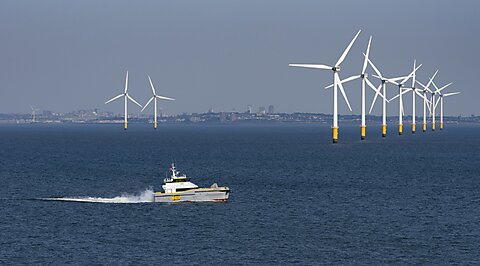Colin Grabow
Danish energy firm Ørsted recently announced that it was scrapping plans for two wind projects off the coast of New Jersey. Known as Ocean Wind 1 and 2, Ørsted said the projects were no longer viable due to high inflation, rising interest rates, and supply chain issues. Those issues, the company added, particularly involved a “vessel delay on Ocean Wind 1 that considerably impacted project timing.”
This was a reference to a specialized wind turbine installation vessel (WTIV) currently being constructed in a Texas shipyard—one plagued by a history of delays—whose delivery has been pushed back by at least a year.
As a Reuters headline summed matters up: “Ship Shortage Dealt Death Blow to Ørsted’s NJ Offshore Wind Hopes.”
Left unsaid by Ørsted (or Reuters) is why the needed WTIV wasn’t purchased from a more reliable overseas shipyard or chartered from the existing fleet of such vessels. That reason is the Jones Act, a protectionist 1920 law that restricts domestic waterborne transportation to vessels that are flagged and built in the United States. There are no WTIVs that meet those requirements, which is a significant hurdle for the offshore wind industry.
Companies seeking to utilize these highly specialized vessels in a manner that complies with the Jones Act face three options: 1) operate the WTIV out of a foreign port (thus making the voyage to the US installation site international rather than domestic); 2) station the vessel at the installation site and have turbine components transported to it from a nearby US port via Jones Act‐compliant “feeder barges” (which brings added risks); and 3) build a WTIV in a US shipyard and register it under the US flag.
Ørsted opted for the third option. More precisely, the company opted to charter a WTIV that is being built for Dominion Energy and was originally slated for delivery by the end of 2023.
But things haven’t quite gone according to plan.
Instead of becoming operational this year, the vessel’s delivery has been pushed back to late 2024 or early 2025. And its price has climbed from $500 million to $625 million.
No one should be surprised. The shipyard constructing the WTIV also experienced cost overruns and significant delays on the last two ships it delivered. A hopper dredge that was originally scheduled to be fully operational by spring 2023 still hasn’t been delivered by the shipyard either.
And there aren’t many alternatives. Other US shipyards that engage in commercial vessel construction such as Philly Shipyard and General Dynamics‐NASSCO are already booked for years to come (mostly filling government contracts).
Without the Jones Act, the vessel for Ørsted’s project could have been built at a lower cost from a more experienced foreign shipyard. Two years ago a South Korean shipyard agreed to build a WTIV—based on the same design as the Dominion Energy vessel (GustoMSC NG-16000X)—in three years for $330 million. That’s nearly $300 million less than what Dominion is paying (and the South Korean‐built vessel will have a more powerful crane to boot).
Perhaps more importantly, the vessel would have had a better chance of being finished on time, thus avoiding the delay that contributed to the New Jersey projects’ demise.
Ørsted’s decision to cancel its two projects is a particular black eye for New Jersey coming only months after its legislature passed legislation allowing the company to keep federal tax credits worth hundreds of millions of dollars instead of passing them along to state ratepayers. Indeed, Trenton’s sensitivity over the cancelation was evidenced by Governor Phil Murphy’s statement that labeled Ørsted’s decision “outrageous” and one that ”calls into question the company’s credibility and competence.”
Perhaps instead of trying to promote offshore wind through subsidy schemes, companies and politicians could instead seek to eliminate government‐imposed obstacles to the industry’s success. Paring back outdated protectionist laws such as the Jones Act would be an excellent place to start.


























